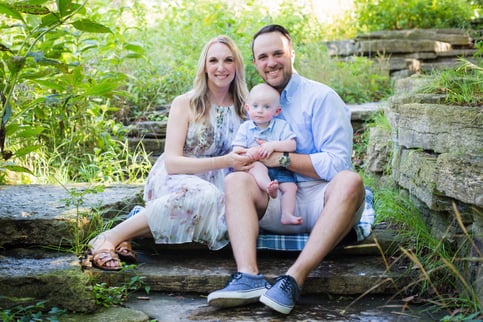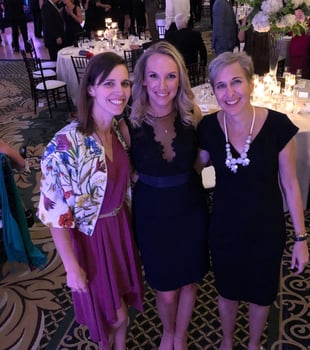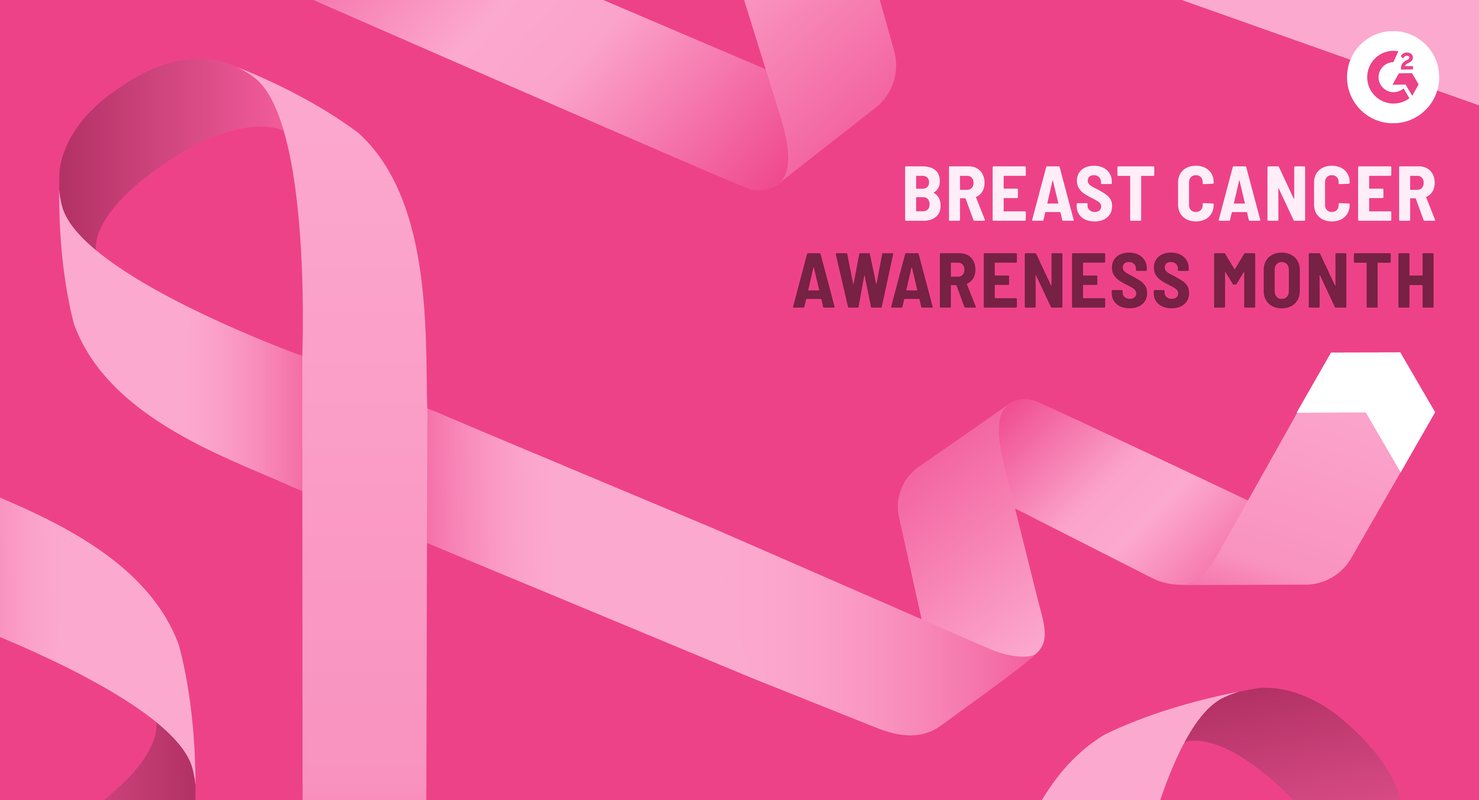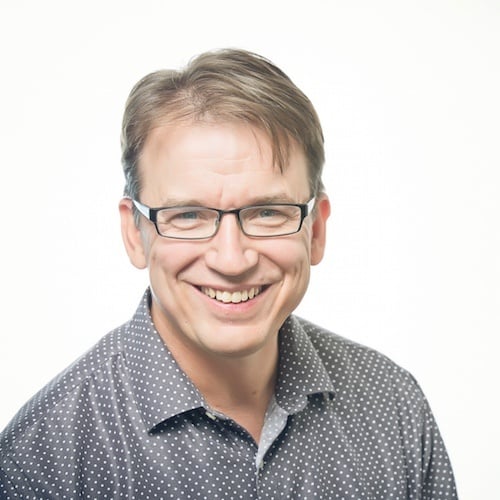According to the National Cancer Institute, 39.5% of people in the U.S. will be diagnosed with cancer at some point during their lifetimes. Specifically, one in 8 women will develop invasive breast cancer over the course of her lifetime. Cancer impacts us all, and our G2 community is no exception.
It’s why G2 has been a passionate supporter of the American Cancer Society (ACS) since 2019 and why ACS is now one of our charitable pillar organizations. For the fourth year in a row, we were a proud sponsor the annual ACS Discovery Ball and I was thrilled to attend the event and represent G2 this year.
-2.png?width=483&name=image%20(6)-2.png)
(From left to right: Priti Patel, Lucie Duffy, and Marty Duffy at 2022 American Cancer Society Discovery Ball)
Internally, our global team is celebrating and supporting Breast Cancer Awareness Month throughout the month of October. We held a virtual kickoff event with our friends from the ACS of Illinois, and on October 1, we started our fundraiser with a goal of raising $10,000 by the end of the month. In support of this fundraiser, we are encouraging G2ers to join the Making Strides walk on October 15th in Chicago or find a walk near them.
I’m proud to work for a company that supports such an important organization and cause. Not only is it a reflection of the PEAK values and culture of G2, but this year, Breast Cancer Awareness Month is very personal.
On Monday, July 25, 2022, the doctor who reviewed my mammogram results didn’t sugarcoat it or give me any false hope. He was simple and straightforward with his response, “I’ve seen enough scans at this point in my career to know what cancer looks like,” he said. “I will not give you any false hope, but there’s a 99% chance this comes back as cancer.”
The next day, I was back in the office for a biopsy with tears streaming down my face. The thoughts going through my mind were, “What does this mean for me? I have an 18-month-old son. What does this mean for my future to even have another child? Is this a death sentence?”
Over and over in my head, I replayed the thought of my baby boy growing up without his mom—the child that I fought so hard to have. He was my little miracle who came at a time when I’d lost hope.
My son wasn't my first pregnancy; he was my second. I lost our first baby halfway through my pregnancy at five months. A baby girl, already so loved, whom I never had the chance to hold in my arms. The closest I came to her was a piece of paper with her tiny footprints on it that was given to me when I was discharged from the hospital. She had a lethal fetal anomaly that was not compatible with life. Along with my doctor, we made the impossibly difficult decision to end my pregnancy. My husband was fully supportive and by my side every step of the way.
Afterwards, I suffered from anxiety and depression. I would wake up in the middle of the night panicked, holding my stomach, searching for a kick to feel her still in me. I cried endlessly and didn’t get out of bed. I thought to myself, “Why and what did I do to deserve this?” It took many sessions of therapy to become functional and be able to say, “I’m okay.”

(Lucie with her son and husband)
Months later, I was pregnant again, but this time it was different. I felt different and it was easier. He was consistently measuring large, or as they would tell me at my ultrasounds, he was healthy. I gave birth to a 9-pound 6-ounce, 22-inch baby boy. He became my world, my universe. While I experienced a lot of guilt being so happy to have him, I still grieved the loss of my daughter. At the time, I thought this was the most difficult thing I will ever have to endure. Life has a funny way of proving you wrong.
After receiving the devastating news that I might have cancer, I imagined what my son’s life would be like without a mom. I replayed what my then 4-year-old nephew said to my husband when Lesley, my sister-in-law, passed away from lung cancer in 2018. “My mommy’s not coming home from the hospital.” Lesley was smart, beautiful, athletic, funny, and never smoked a day in her life, yet her life was cut short at the age of 41 by the horrific disease. I saw the heartbreaking grief in her children’s eyes. It was cruel and shattered my heart—not only for her children, but also for her husband, her family and her friends. She was loved by so many and had an amazing ability to bring people together. She is missed to this day.

(Lucie with her sister-in-laws. Meghan on left and Lesley on right)
While I waited for my biopsy results, I felt numb. On Thursday, July 28, it was confirmed. I had breast cancer in my right breast that was both estrogen and progesterone positive, measuring at 1.17 cm. I received the call from my OBGYN , who had been monitoring the portal all day for the pathology labs to post. I was grateful that it was her who called. I’ll never forget her voice, “This is just bullsh*t and I’m so sorry to even have to say this… But it’s cancer.” She quickly pivoted to telling me the good news, that this is the most common type of breast cancer and it responds well to treatment. She reminded me that it wasn't a death sentence and was thankful that we caught it early. Despite delivering this devastating news, she gave me hope.
My OBGYN gave me recommendations for surgical oncology, medical oncology, and radiation oncologists. She told me that if it took longer than two weeks to get an appointment, to call her. I felt some relief knowing I had her monitoring my path forward, making sure I had all of the necessary resources. The best advice she gave me regarding navigating this process was to advocate for myself — asking for direct phone numbers to departments and scheduling and if there are waitlists available to move up appointments. I scheduled an appointment with my surgeon on August 1 and began the grueling process of checking off the boxes of seemingly endless appointments.
While going through testing, I kept wondering how I got breast cancer. I have no known history of cancer in my family. I do not carry the BRCA gene. I wasn't over the age of 40 and I felt no lump or mass. Other than my mammogram coming back showing the cancerous area, I would have had no idea that I had cancer growing inside of my body. I was one of the lucky ones who caught this early.
When I asked my surgical oncologist if this was a one-off scenario she said, “Unfortunately, no.” The guidelines tell you to do self-breast exams each month, get a mammogram after you turn 40, and to call your doctor if you feel a lump or any abnormality during a self check. I fell into none of those categories, but after hearing a few stories from acquaintances and friends who were diagnosed with breast cancer in the past year, I made an appointment for an early mammogram. My proactive decision saved my life.
On October 11, 2022, I’ll be heading into surgery to remove my cancer and start my treatment plan. Once cleared from surgery, I will also be working with the oncofertility team at Northwestern for egg retrieval/preservation. According to the ACS, approximately 68% of cancer patients between the ages of 15 and 44 will need fertility preservation. Cancer patients currently have this privilege, but should a nationwide abortion ban exist, it has the potential to impact me and every other females suffering from cancer. Not having the ability to protect their fertility is a fear for many women already dealing with the burden of cancer.
I share my story to encourage you to get a mammogram, even if your doctor says that you don’t need one because you don’t fall into any of the risk categories. I didn't either.
I share my story because I want it to stay with you so you tell your loved ones, friends, and others.
I share my story because I’m thankful for the support that I’ve received from my husband, family, friends, coworkers, clients, and my community.
I will get through this. I will beat cancer.


 by Tim Handorf
by Tim Handorf
 by Mara Calvello
by Mara Calvello